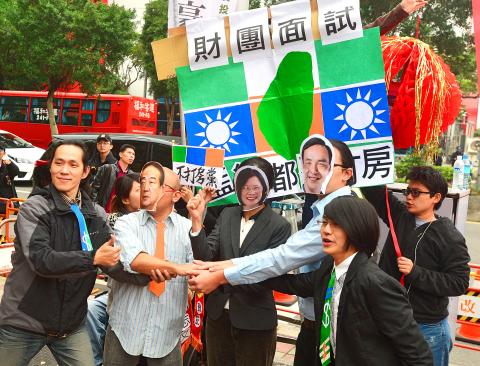A contingent of 227 police officers was deployed by the Taipei City Police Department’s Neihu Precinct yesterday to keep the peace near the Sanlih Television building in Taipei where the second and final presidential debate was held.
At about noon, various protest groups started setting up their banners, staging skits and chanting slogans.
Among the protesters were dozens of landowners from Taipei’s Wufenpu (五分埔) garment district demanding that the Chinese Nationalist Party (KMT) produce a solution regarding eight families that were unlisted when the city government relocated residents in 1955 to enlarge roads.

Photo: Wang Yi-sung, Taipei Times
There were also representatives of families from New Taipei City’s Sinjhuang District (新莊) who were forced to relocate to make way for an MRT maintenance depot, who demanded that the presidential candidates address the issue of housing relocation.
Members of the Anti-Forced Relocation Alliance also protested against the Urban Planning Act (都市計畫法) and the Urban Space Rezoning Enforcement Act (市地重劃實施辦法), criticizing the laws as outdated and not allowing a sufficient level of public consultation.
The protesters called for the three presidential candidates not to ignore the suffering of the public.
Members of The People Are The Boss — a left-wing political party established in 2011 — also protested at the site, criticizing KMT presidential candidate Eric Chu (朱立倫), Democratic Progressive Party presidential candidate Tsai Ing-wen (蔡英文) and People First Party presidential candidate James Soong (宋楚瑜) over what they described as the candidates’ failures to uphold justice in their housing policies.
The three political parties seemed to have a consensus on not touching the real-estate issue, the members added.
The protesters dispersed peacefully after voicing their demands.

The manufacture of the remaining 28 M1A2T Abrams tanks Taiwan purchased from the US has recently been completed, and they are expected to be delivered within the next one to two months, a source said yesterday. The Ministry of National Defense is arranging cargo ships to transport the tanks to Taiwan as soon as possible, said the source, who is familiar with the matter. The estimated arrival time ranges from late this month to early next month, the source said. The 28 Abrams tanks make up the third and final batch of a total of 108 tanks, valued at about NT$40.5 billion

A group from the Taiwanese Designers in Australia association yesterday represented Taiwan at the Midsumma Pride March in Melbourne. The march, held in the St. Kilda suburb, is the city’s largest LGBTQIA+ parade and the flagship event of the annual Midsumma Festival. It attracted more than 45,000 spectators who supported the 400 groups and 10,000 marchers that participated this year, the association said. Taiwanese Designers said they organized a team to march for Taiwan this year, joining politicians, government agencies, professionals and community organizations in showing support for LGBTQIA+ people and diverse communities. As the first country in Asia to legalize same-sex

Travel agencies in Taiwan are working to secure alternative flights for travelers bound for New Zealand for the Lunar New Year holiday, as Air New Zealand workers are set to strike next week. The airline said that it has confirmed that the planned industrial action by its international wide-body cabin crew would go ahead on Thursday and Friday next week. While the Auckland-based carrier pledged to take reasonable measures to mitigate the impact of the workers’ strike, an Air New Zealand flight arriving at Taipei from Auckland on Thursday and another flight departing from Taipei for Auckland on Saturday would have to

MOTIVES QUESTIONED The PLA considers Xi’s policies toward Taiwan to be driven by personal considerations rather than military assessment, the Epoch Times reports Chinese President Xi Jinping’s (習近平) latest purge of the Chinese People’s Liberation Army (PLA) leadership might have been prompted by the military’s opposition to plans of invading Taiwan, the Epoch Times said. The Chinese military opposes waging war against Taiwan by a large consensus, putting it at odds with Xi’s vision, the Falun Gong-affiliated daily said in a report on Thursday, citing anonymous sources with insight into the PLA’s inner workings. The opposition is not the opinion of a few generals, but a widely shared view among the PLA cadre, the Epoch Times cited them as saying. “Chinese forces know full well that